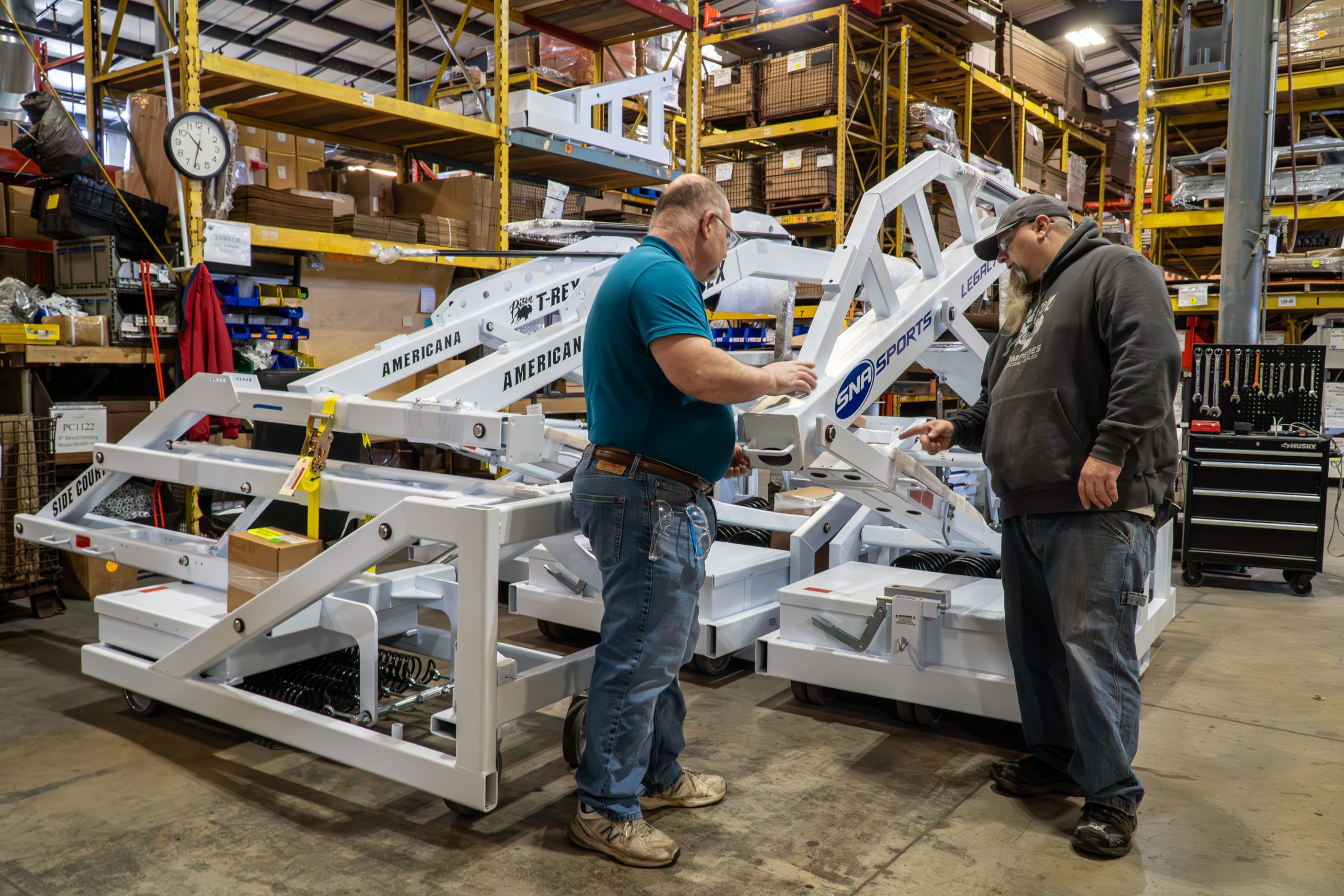Inside the production facility of Bison, Inc., two men share a story that begins with struggle and ends with transformation. Phil, the plant manager, and Will, an assembler, are both formerly incarcerated individuals. Today, they are united by opportunities created in alignment with the Prosper Lincoln initiative.
For both men, this journey is about more than just jobs — it’s about second chances and building a better future.
From Challenges to Leadership
Once a supervisor in a maximum-security facility, Phil’s life took an unexpected turn when he served a federal prison sentence. After his release, Phil had to start over.
“When I began working at Bison, I was living in a halfway house and riding a bike to get to work,” he recalls.
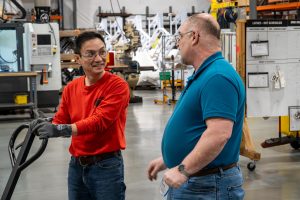
Pictured: Phil Studnicka (right) with his former Supervisor Anthony Phan, who now reports to Phil at the Bison, Inc. Warehouse. Photo credit: Charles Haacker.
Starting in tool and die, Phil quickly rose through the ranks, eventually spearheading the creation of an upholstery department that produces custom padding for gymnasiums nationwide.

Pictured: Phil Studnicka with some of the upholstered gym padding produced at the Bison, Inc. Warehouse. Photo credit: Charles Haacker.
Now a plant manager, Phil’s mission extends beyond production. “Bison gave me a second chance, and I want to do the same for others,” he says.
A Class That Changes Lives
Will’s journey to Bison began during his time on work release at Lincoln’s Community Corrections Center. While there, he enrolled in the manufacturing basics class offered by the Lincoln Manufacturing Council (LMC). LMC is a program run by the Lincoln Partnership for Economic Development (LPED) that equips individuals with foundational skills for a manufacturing career.
“I’d never worked in manufacturing before, but the class opened my eyes,” Will says. “Phil taught us everything, even using Legos to demonstrate how to follow schematics. It felt like solving a puzzle, and I realized this was something I could do.”
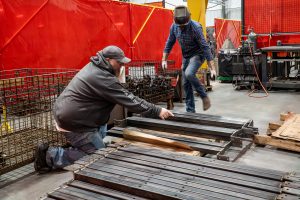
Pictured: Will Purdue pointing at a Center Strut Fan Basketball Adapter produced at the Bison, Inc. warehouse. Photo credit: Charles Haacker.
After completing the class, Will was hired at Bison, first cutting metal for basketball hoops and later advancing to the Intellectual Products Initiative (IPI) division. “This job is more than a paycheck — it’s a career,” Will explains. “It’s given me purpose and a way to provide for my family.”
LMC’s Role in Strengthening Lincoln
The Lincoln Manufacturing Council plays a critical role in creating these opportunities. By partnering with manufacturers like Bison and designing programs like the Manufacturing Basics class, LMC equips participants with essential technical skills, connects individuals with potential employers, and helps address a key economic need: filling skilled manufacturing positions.
“All of our communities across the country are desperate for good workers,” says Phil. “LMC bridges the gap, showing manufacturers and community members that formerly incarcerated individuals can be successful employees.”
The impact extends far beyond individuals. Nebraska’s manufacturing employment has grown almost 16 times the national rate. Manufacturing is vital to Lincoln’s economy, and ensuring these roles are filled strengthens the entire community.
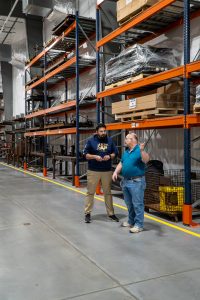
Pictured: Phil Studnicka (right) with his second in command, Arman Ebrahimi, Assistant Plant Manager (left), at the Bison, Inc. Warehouse. Photo credit: Charles Haacker.
Allison Hatch, LPED’s director of workforce development, is the driver of Prosper Lincoln’s Innovative Workforce focus area and oversees LMC. She says the program has held 24 manufacturing Basics classes since 2019, with 271 individuals earning completion certificates.
“We’re not just creating jobs — we’re creating knowledge of manufacturing for the community,” Hatch explains. “By bringing manufacturers and individuals together, we’re driving economic growth while also transforming lives. It’s a win-win.”
Supporting Second Chances
Phil’s experience motivates him to give back. As an LMC instructor, he teaches manufacturing classes in correctional facilities, high schools, and community centers, reaching individuals who often face significant barriers to employment.
“These programs connect people with opportunities they might never have had,” Phil says. “I’ve been in their shoes, and I know what it means to have someone believe in you.”
Will acknowledges the barriers that justice-involved individuals face. “Without this class and Bison’s willingness to hire me, I don’t know where I’d be,” he shares. “Many employers won’t give people like me a chance, but LMC and Bison see what we’re capable of.”
Building a Stronger Community
The partnership between Bison and LMC demonstrates the power of community collaboration. By addressing workforce challenges and providing second chances, these initiatives contribute to Lincoln’s growth and inclusivity.
Will says the opportunity has been life-changing. “Before this, I didn’t know what manufacturing was about. Now I’m part of something bigger, and it’s opened doors I never thought possible.”
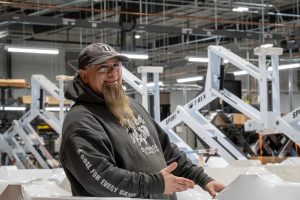
Pictured: Will Purdue, in front of some of the basketball systems produced at the Bison, Inc. warehouse. Photo credit: Charles Haacker.
For Phil, seeing employees like Will thrive is the ultimate reward. “When you give people a second chance, you’re not just helping them — you’re strengthening the entire community.”
Ensuring Prosperity for Everyone In Lincoln
LMC’s broader impact is directly tied to the objectives of Prosper Lincoln’s agenda, which falls under the purview of the Lincoln Community Foundation (LCF). Prosper Lincoln focuses on an innovative workforce among its core pillars, fostering cross-sector collaboration to address Lincoln’s most pressing needs.
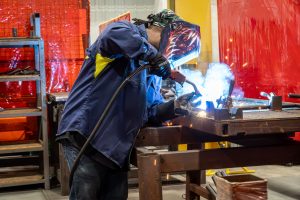
Pictured: Welding a Volleyball Judges Stand at the Bison, Inc. warehouse. Photo credit: Charles Haacker
LCF President Tracy Edgerton reflects on the significance of this work. “The Manufacturing Basics class is a perfect example of how our community’s focus on workforce innovation creates real change,” she comments. “By fostering programs like this, we’re not only addressing immediate job market needs but also contributing to individuals’ upward economic mobility and Lincoln’s overall quality of life.”
The Connection Between LCF, Prosper Lincoln, and Workforce Innovation
Prosper Lincoln works by bringing the right people and organizations together to address challenges like workforce development. LCF serves as the backbone of Prosper Lincoln, which has been critical in contributing to the collaborative environment that makes initiatives like LMC possible.
“It’s not about managing every program,” says Tracy. “It’s about creating the connections and environment where solutions like the Manufacturing Basics class can thrive.”
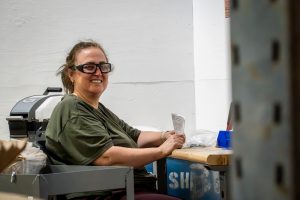
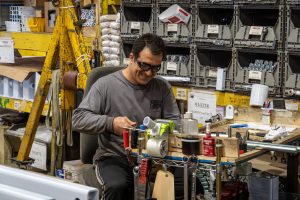
Pictured: Mohsen Jafari and Diba Jafari, a husband and wife team who work at the Bison, Inc. warehouse. Photo credit: Charles Haacker.
As Prosper Lincoln moved forward, LMC didn’t sever ties with Prosper Lincoln and LCF; instead, Prosper Lincoln’s support for LMC continued to evolve. Additionally, the regular collaboration between Prosper Lincoln “Drivers” and LCF fosters a strategic framework that strengthens workforce development efforts citywide.
This collaborative approach began in the second phase of Prosper Lincoln when three manufacturers (Bison, TMCO, and Kawasaki) launched LMC in 2019. The partnership exemplifies Prosper Lincoln’s ability to unite diverse stakeholders to solve complex challenges, like the persistent barriers faced by individuals with criminal records. Many employers hesitate to hire formerly incarcerated individuals, making programs like these indispensable for providing second chances.
Looking Toward the Future
The economic impact of these efforts extends beyond individual success stories. Manufacturing is a cornerstone of Lincoln’s economy, and filling these roles ensures the sector remains competitive and robust. Hatch highlights the importance of this collaboration. “Lincoln’s manufacturing sector thrives on skilled workers. By connecting individuals with training and employers with talent, we’re fueling growth and creating a more inclusive economy,” she states.
As Phil puts it, “This isn’t just a job — it’s a future.” And with the support of initiatives like Prosper Lincoln, that future is brighter for all of Lincoln.

